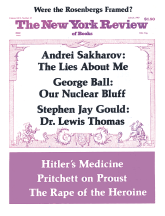In response to:
On the Trail of Nature from the June 2, 1983 issue
To the Editors:
A delight, of course, to read Stuart Hampshire’s review of Keith Thomas’s Man and the Natural World [NYR, June 2], until the last four paragraphs but one, where we are given Professor Hampshire’s own philosophical improvements. The question concerns an enlarged sympathy with animals, and while this is sometimes credited to Jeremy Bentham, Hampshire agrees with Thomas that other factors have contributed. At this point, Hampshire, taking off on his own, finds that the best of the contributions come from “naturalists” rather than “anthropocentrists.” Neither of these combatants is defined with any precision, but at least the “naturalists” take “human nature to be an interesting but not central episode in nature.” Professor Hampshire does not like the “breezy tone” of some naturalists, but prefers the “grave and prophetic tone” of Lucretius and Spinoza. They are represented as appealing to fortitude and justice of mind, and ridiculing “anthropocentrism” as primitive, a prolongation of childishness and a fear of nullity. Moreover, anthropocentrism is the “vulgar thought…that the galaxies, millions of light years away, were arranged for human beings.” Hampshire’s view now assimilated to that of Thomas, is that we are now to regard our own species as “one among an indefinite number of natural kinds and not as uniquely privileged either in its origins or destiny.”
All that remains is to see what this means. So far as I can see Hampshire prefers to take the point of view of Nature, extending it out at least as far as the galaxies, finding at last that the galaxies don’t care about us, although we care a little bit about them, if only to keep time. That Nature doesn’t have any point of view, escapes Professor Hampshire’s discussion. The curious thing however is that Hampshire should choose to adopt a point of view, that of “Nature,” which would be precisely the one to leave him and us at a loss for even the slightest bit of moral clarity. Here we are lost among an indefinite number of natural kinds, all of which are on the same plane. This indeed leaves us all, Stuart Hampshire, myself, and all the rest of us as nullities. All this is “grave and prophetic” indeed; I hope grave rather than prophetic. Why choose a point of view which isn’t any?
This is an old naturalism, of course, and its chief if not only defect is that it leaves us without the slightest basis for its hoped for morality. I do not know what Professor Hampshire eats, but since he is happily alive, I assume he dines on more than earth, air, fire, and water, but from time to time eats animals and plants. He therefore cannot regard himself as without privileges, nor as only one among an indefinite miscellany of natural types, all the same in value; he must betray his own neutral Naturalism every time he eats breakfast, or says “no” to voice.
And so: all types of natural things are not the same in value, nor are they of the same order, nor do they have the same origins and destiny. To assume that is to render choice impossible. And those of us who disagree are still kind to animals, but if, from the point of view of Nature, we are all an unprivileged type, why be kind either to ourselves or to the dear animals? Plants will have to fend for themselves.
William Earle
Northwestern University
Evanston, Illinois
Stuart Hampshire replies:
Professor Earle asserts that, being a “neutral naturalist” (his description) I must betray my own beliefs every time I eat breakfast or say “no” to vice. Not so: I can offer a reasonable moral justification of my habit of eating animals, and of not generally welcoming vice, without claiming that the universe has been arranged for the benefit of human beings, or even that human beings are known to be the best and most noble of natural kinds. Only these last two claims were denied in my review.
This Issue
July 21, 1983



